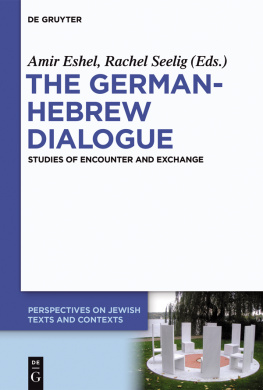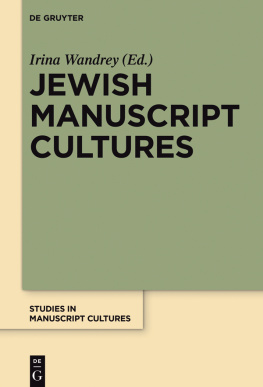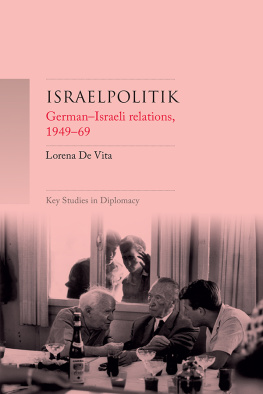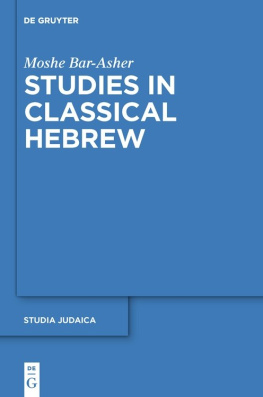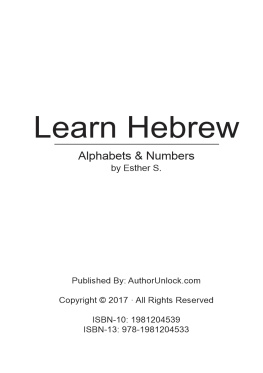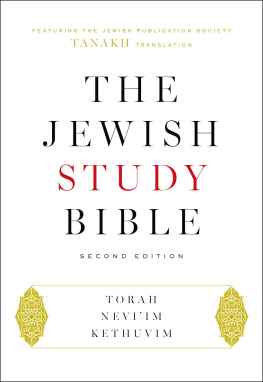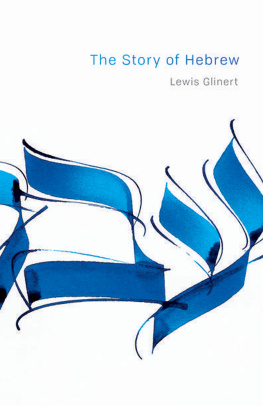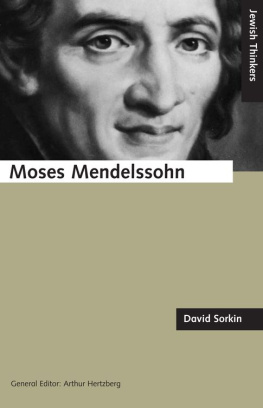Contents
Guide

The German-Hebrew Dialogue
Perspectives on Jewish Texts and Contexts

Edited by
Vivian Liska
Editorial Board
Robert Alter, Steven E. Aschheim, Richard I. Cohen, Mark H. Gelber, Moshe Halbertal, Christine Hayes, Moshe Idel, Samuel Moyn, Ada Rapoport-Albert, Alvin Rosenfeld, David Ruderman, Bernd Witte
Volume 6
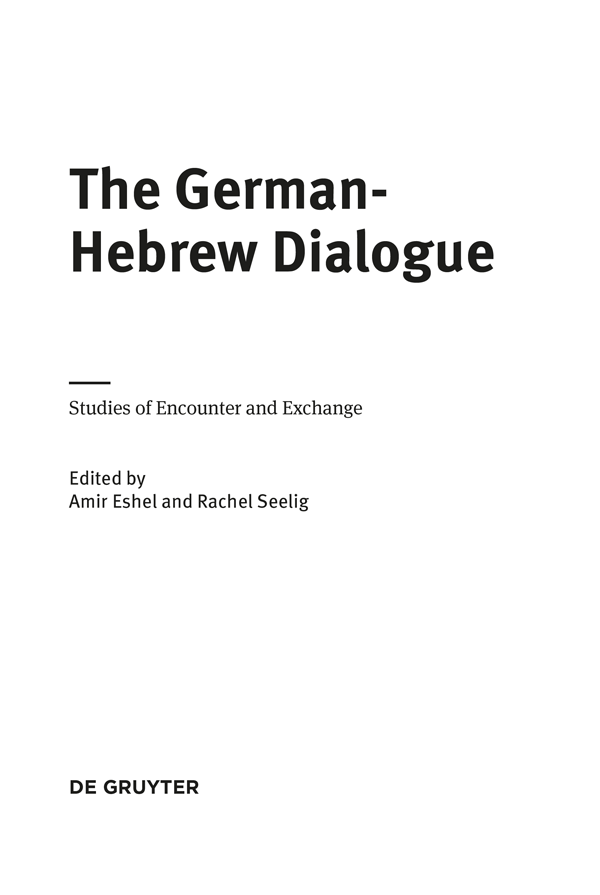
ISBN 978-3-11-047135-9
e-ISBN (PDF) 978-3-11-047338-4
e-ISBN (EPUB) 978-3-11-047160-1
ISSN 2199-6962
Library of Congress Cataloging-in-Publication Data
A CIP catalog record for this book has been applied for at the Library of Congress.
Bibliographic information published by the Deutsche Nationalbibliothek
The Deutsche Nationalbibliothek lists this publication in the Deutsche Nationalbibliografie; detailed bibliographic data are available on the Internet at http://dnb.dnb.de.
2018 Walter de Gruyter GmbH, Berlin/Boston
Cover image: Dani Karavan, Mifgash , 20045. Water, grass, white Carrara marble, red bricks, text; 1.5 4.5 4.5 m. Villa Lemm, Berlin, Germany. Photo: Studio Dani Karavan
www.degruyter.com
Rachel Seelig with Amir Eshel
Editors Introduction
1Opening the dialogue
Meine Muttersprache ist nicht die Muttersprache meiner Mutter. Die Muttersprache meiner Mutter ist nicht die Muttersprache ihre Mutter. Die Mutter Sprache ihre Mutter ist nicht die Muttersprache und so weiter. Und So viel viel weiter . (Tomer Gardi 2016, 91)
[My mother tongue is not my mothers mother tongue. My mothers mother tongue is not the mother tongue her mother. The mother tongue her mother is not her mother tongue and on and on. And so much much more on.]
Fragmented, ungrammatical, some might say improper, Broken German is not only the title of Israeli writer Tomer Gardis latest novel but also the language in which it was written. As a hopeful for the 2016 Ingeborg Bachmann Prize, Gardi was the dark horse in what has been described as the most diverse group of nominees in the prizes thirty-nine year history, with five out of fourteen authors claiming non-German citizenship or ancestry (including the winner, British-Ghanaian novelist Sharon Dodua Otoo). Yet unlike all of the other nominees, Gardi, a native of Kibbutz Dan and resident of Tel Aviv, neither lives in a German-speaking country nor speaks German perfectly. His nomination for the Bachmann Prize points to a loosening of norms surrounding the aesthetics and politics of German. Is proper German ( reines Deutsch ) no longer a prerequisite for receiving one of the highest German literary honors? This was the question on everyones mind at the Festival of German-Language Literature in Klagenfurt, Austria.
The question is deceptively simple. Today, with three and even four generations of Turkish migrants and post-migrants calling Germany home, and swaths of immigrants and refugees entering the country every year, most recently from Syria, the country that Helmut Kohl once famously declared not an immigration land ( kein Einwanderungsland ) is now remarkably multicultural and multilingual. In light of the demographic changes as well as reactionary opposition to these changes from the Radical Right the notion of proper German has become highly controversial. According to Klaus Katsberger, the judge who nominated Gardi for the Bachmann Prize, broken German constitutes an important alternative to this hegemonic concept. In his view, Gardis ungrammatical idiom is the language of newcomers and a powerful symbol of Germanys emerging welcome culture ( Willkommenskultur ). One should have more faith in German literature, Katsberger argues, It succeeds where European politics fails . Providing a home to the refugee and to linguistic immigration, which arrived long ago and live among us, is among [this literatures] greatest tasks (Katsberger 2016).
Katsbergers remarks reflect a shift in the critical reception of writing by so-called Auslnder (foreigners) in the last half century. It is certainly a departure from the reactions provoked by Paul Celans receipt of the Georg Bchner Prize in 1960, which betrayed abiding anti-Semitic sentiments in describing the poets hermetic language as the product of an alien ( Fremdling ) from the eastern outskirts of the German-language domain (Eshel 2004, 59). In the postreunification era a similar argument about language was attributed to Turkish-German migrant writers such as Emine Sevgi zdamar, the first non-native German speaker to receive the Bachmann Prize in 1991. One critic of zdamars play Karagz in Almania (1982) declared, Broken German is tantamount to bad theater, while another, commenting on zdamars Bachmann-Prize submission, condescendingly praised the awkwardness ( Unbeholfenheit ) of the language as a sign of its authenticity, ignoring the deliberate nature of zdamars language errors (Jankowsky 1997, 267). Today, twenty-five years since reunification and zdamars Bachmann Prize victory, writers who consistently expand the horizon of the German language and the sphere of German literature are respected, indeed celebrated around the globe. Yoko Tawadas ascendance to global literary recognition is but one indication of this tendency (Galchen 2016).
Tomer Gardi, neither a native German speaker like Celan, nor a migrant to Germany like zdamar and Tawada, is seen not as an illegitimate interloper but as emerging talent worthy of consideration. During the judges discussion at the Bachmann Prize competition, Hildegard Keller summed up the state of affairs with a comment that mimicked what she called Gardis poetic pidgin, saying, German belongs to everyone. German belongs also to me. I can Bachmann Prize!
Gardis self-confident arrival on the German literary scene signals not only a transformation in German attitudes toward writing by so-called Auslnder but also a change in Israeli attitudes toward Germany and the German language. It is therefore an appropriate point of departure for the present volume, which is devoted to exploring the fraught yet fruitful relationship between German and Hebrew cultures, two cultures long viewed as separate or even as diametrically opposed. The essays gathered here call into question the prevailing belief, which gained purchase in the wake of World War II and the Holocaust, that there was no space for German in Israeli culture, just as there remained no trace of Hebrew in German culture. The notion that German and Hebrew could occupy the same cultural space seemed unfathomable, even anathema.
During the early years of Israeli statehood, German became taboo, despite the fact that it had been the lingua franca of thousands of Jewish immigrants and possibly the most commonly heard language in the coffeehouses of the yishuv during the 1930s and 1940s (Halperin 2015, 46). At the Hebrew University of Jerusalem, German language instruction was banned in 1934 in response to the ascent of the Nazi regime, even though roughly fifty percent of the faculty at the time were either native German speakers or trained in German universities. It was not until 1953, following the signing of a reparations agreement between Israel and West Germany, that German courses were reintroduced at the university (Weiss 2014). Even after the establishment of diplomatic relations between West Germany and Israel in 1965, the relationship between the two cultures remained tense. German, once celebrated as a vehicle of Bildung , came to be linked in the nascent Israeli imagination with Hitlers regime; the language of Goethe and Schiller was now tied to the perpetrators of the Holocaust.

